
Johann Ludwig Bach was a German composer and violinist.
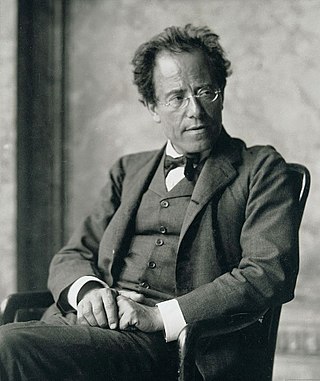
Das Lied von der Erde is an orchestral song cycle for two voices and orchestra written by Gustav Mahler between 1908 and 1909. Described as a symphony when published, it comprises six songs for two singers who alternate movements. Mahler specified that the two singers should be a tenor and an alto, or else a tenor and a baritone if an alto is not available.
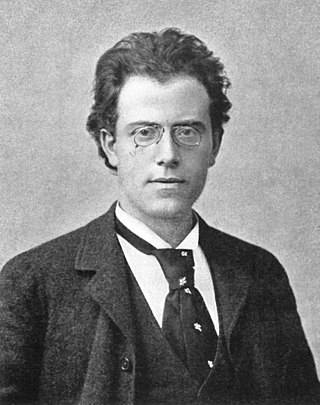
Lieder eines fahrenden Gesellen is a song cycle by Gustav Mahler on his own texts. The cycle of four lieder for medium voice was written around 1884–85 in the wake of Mahler's unhappy love for soprano Johanna Richter, whom he met as the conductor of the opera house in Kassel, Germany, and orchestrated and revised in the 1890s.

Verklärte Nacht, Op. 4, is a string sextet in one movement composed by Arnold Schoenberg in 1899. Composed in just three weeks, it is considered his earliest important work. It was inspired by Richard Dehmel's poem of the same name, combined with the influence of Schoenberg's strong feelings upon meeting the sister of his teacher, Alexander von Zemlinsky (1877–1942), whom he married in 1901. The movement can be divided into five distinct sections which refer to the five stanzas of Dehmel's poem; however, there are no unified criteria regarding movement separation.
Hans-Friedrich Blunck was a German jurist and a writer. In the time of the Third Reich, he occupied various positions in Nazi cultural institutions.
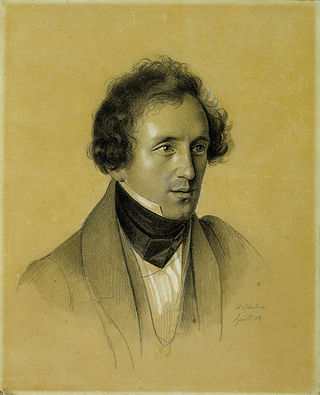
St. Paul, Op. 36, is an oratorio by Felix Mendelssohn. The composer oversaw versions and performances in both German and English within months of completing the music in early 1836.

Ireen Sheer is a German-English singer. She had a top five hit on the German singles chart with "Goodbye Mama" in 1973. She went on to finish fourth at the Eurovision Song Contest 1974 representing Luxembourg, sixth at the Eurovision Song Contest 1978 representing Germany, and thirteenth at the Eurovision Song Contest 1985 representing Luxembourg again.

"Vater Unser, Part II " is the eighth single released by the German music project E Nomine, and appears on the 2004 album Das Beste aus... Gottes Beitrag und Teufels Werk. This tracks is a mix of 'Vater Unser' and 'Psalm 23' from "Das Testament" (1999).

"Prometheus" is a poem by Johann Wolfgang von Goethe, in which the character of the mythic Prometheus addresses God in misotheist accusation and defiance. The poem was written between 1772 and 1774 and first published in 1789 after an anonymous and unauthorised publication in 1785 by Friedrich Heinrich Jacobi. It is an important work of the Sturm und Drang movement.
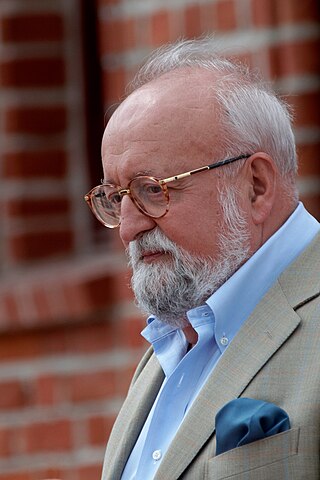
The Symphony No. 8 "Lieder der Vergänglichkeit" by Krzysztof Penderecki is a choral symphony in twelve relatively short movements set to 19th and early 20th-century German poems. The work was completed and premiered in 2005. The symphony has an approximate duration of 35 minutes. Penderecki revised the symphony in 2007 by adding a few more poem settings and the piece has expanded to around 50 minutes. Although given the designation Symphony No. 8, it was not actually the final symphony Penderecki completed before his death in March 2020; the Sixth Symphony, begun in 2008, was not completed until 2017.

"Heimliche Aufforderung", Op. 27, No. 3, is one of a set of four songs composed for voice and piano by Richard Strauss in 1894. The German conductor Robert Heger orchestrated it in 1929. The text is from a poem in German by John Henry Mackay.

Vox Christi, Latin for Voice of Christ, is a setting of Jesus' words in a vocal work such as a Passion, an Oratorium or a Cantata. Conventionally, for instance in Protestant music of the Baroque era, the vox Christi is set for a bass voice.
The 66 Chorale improvisations for organ, Op. 65, were composed by Sigfrid Karg-Elert between 1906 and 1908, and first published in six volumes in 1909. The composition was dedicated to "the great organist Alexandre Guilmant".
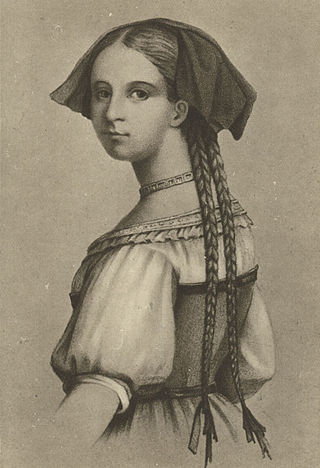
"Welcome and Farewell" is a poem by Johann Wolfgang von Goethe from the collection Sesenheimer Lieder. It was published for the first time in 1775 in the women's magazine Iris. Franz Schubert set it to music as a lied (D.767).
Franz Schubert's best-known music for the theatre is his incidental music for Rosamunde. Less successful were his many opera and Singspiel projects. On the other hand, some of his most popular Lieder, like "Gretchen am Spinnrade," were based on texts written for the theatre.
Bach's first cantata cycle refers to the church cantatas Johann Sebastian Bach composed for the somewhat less than 60 occasions of the liturgical year of his first year as Thomaskantor in Leipzig which required concerted music. That year ran from the first Sunday after Trinity in 1723 to Trinity Sunday of the next year:
- Trinity I, 30 May 1723: Die Elenden sollen essen, BWV 75
- Trinity II, 6 June 1723: Die Himmel erzählen die Ehre Gottes, BWV 76
- Trinity III, 13 June 1723: Weimar cantata Ich hatte viel Bekümmernis, BWV 21 restaged
- Trinity IV, 20 June 1723: Ein ungefärbt Gemüte, BWV 24, and Weimar cantata Barmherziges Herze der ewigen Liebe, BWV 185 restaged
- Nativity of St. John the Baptist, 24 June 1723: Ihr Menschen, rühmet Gottes Liebe, BWV 167
- Trinity V, 27 June 1723: no extant cantata
- Visitation, 2 July 1723: Herz und Mund und Tat und Leben, BWV 147 and possibly Magnificat in E-flat major, BWV 243a
- Trinity VI, 4 July 1723: no extant cantata
- Trinity VII, 11 July 1723: Ärgre dich, o Seele, nicht, BWV 186
- Trinity VIII, 18 July 1723: Erforsche mich, Gott, und erfahre mein Herz, BWV 136
- Trinity IX, 25 July 1723: Herr, gehe nicht ins Gericht mit deinem Knecht, BWV 105
- Trinity X, 1 August 1723: Schauet doch und sehet, ob irgend ein Schmerz sei, BWV 46
- Trinity XI, 8 August 1723: Siehe zu, daß deine Gottesfurcht nicht Heuchelei sei, BWV 179 and Weimar cantata Mein Herze schwimmt im Blut, BWV 199 restaged
- Trinity XII, 15 August 1723: Lobe den Herrn, meine Seele, BWV 69a
- Trinity XIII, 22 August 1723: Du sollt Gott, deinen Herren, lieben, BWV 77
- Trinity XIV, 29 August 1723: Es ist nichts Gesundes an meinem Leibe, BWV 25
- (30 August 1723, Ratswechsel: not part of the liturgical year, see below)
- Trinity XV, 5 September 1723: Warum betrübst du dich, mein Herz, BWV 138
- Trinity XVI, 12 September 1723: Christus, der ist mein Leben, BWV 95
- Trinity XVII, 19 September 1723: Bringet dem Herrn Ehre seines Namens, BWV 148
- Trinity XVIII, 26 September 1723: no extant cantata
- St. Michael's Day, 29 September 1723: no extant cantata
- Trinity XIX, 3 October 1723: Ich elender Mensch, wer wird mich erlösen, BWV BWV 48
- Trinity XX, 10 October 1723: Weimar cantata Ach! ich sehe, itzt, da ich zur Hochzeit gehe, BWV 162 restaged
- Trinity XXI, 17 October 1723: Ich glaube, lieber Herr, hilf meinem Unglauben, BWV 109
- Trinity XXII, 24 October 1723: Was soll ich aus dir machen, Ephraim, BWV 89
- Reformation Day, 31 October 1723 : possibly Weimar cantata Nur jedem das Seine, BWV 163 restaged; Alternatively an early version of BWV 80/80b?
- Trinity XXIV, 7 November 1723: O Ewigkeit, du Donnerwort, BWV 60
- Trinity XXV, 14 November 1723: Es reißet euch ein schrecklich Ende, BWV 90
- Trinity XXVI, 21 November 1723: Wachet! betet! betet! wachet! BWV 70
- Advent I, 28 November 1723: Weimar cantata Nun komm, der Heiden Heiland, BWV 61 restaged
- Christmas, 25 December 1723: Weimar cantata Christen, ätzet diesen Tag, BWV 63 restaged; Also Magnificat, BWV 243a and Sanctus in D major, BWV 238
- Second Day of Christmas, 26 December 1723: Darzu ist erschienen der Sohn Gottes, BWV 40
- Third Day of Christmas, 27 December 1723: Sehet, welch eine Liebe hat uns der Vater erzeiget, BWV 64
- New Year, 1 January 1724: Singet dem Herrn ein neues Lied, BWV 190
- Sunday after New Year, 2 January 1724: Schau, lieber Gott, wie meine Feind, BWV 153
- Epiphany, 6 January 1724: Sie werden aus Saba alle kommen, BWV 65
- Epiphany I, 9 January 1724: Mein liebster Jesus ist verloren, BWV 154
- Epiphany II, 16 January 1724: Weimar cantata Mein Gott, wie lang, ach lange? BWV 155 restaged
- Epiphany III, 23 January 1724: Herr, wie du willt, so schicks mit mir, BWV 73
- Epiphany IV, 30 January 1724: Jesus schläft, was soll ich hoffen? BWV 81
- Purification, 2 February 1724: Erfreute Zeit im neuen Bunde, BWV 83
- Septuagesima, 6 February 1724: Nimm, was dein ist, und gehe hin, BWV 144
- Sexagesima, 13 February 1724: Leichtgesinnte Flattergeister, BWV 181 and Weimar cantata Gleichwie der Regen und Schnee vom Himmel fällt, BWV 18 restaged in its Leipzig version
- Estomihi, 7 February 1723 and 20 February 1724 : Jesus nahm zu sich die Zwölfe, BWV 22 and Du wahrer Gott und Davids Sohn, BWV 23 restaged in its first Leipzig version
- Annunciation and Palm Sunday 25 March 1724: Siehe eine Jungfrau ist schwanger, BWV 1135 and Weimar cantata Himmelskönig, sei willkommen, BWV 182 restaged.
- (Good Friday, 7 April 1724: St John Passion, BWV 245, 1st version — Passion, not considered as a cantata part of the cycle)
- Easter, 9 April 1724: early cantata Christ lag in Todes Banden, BWV 4 restaged ; Weimar cantata Der Himmel lacht! Die Erde jubilieret, BWV 31 restaged
- Easter Monday, 10 April 1724: Erfreut euch, ihr Herzen, BWV 66
- Easter Tuesday, 11 April 1724: Ein Herz, das seinen Jesum lebend weiß, BWV 134
- Quasimodogeniti, 16 April 1724: Halt im Gedächtnis Jesum Christ, BWV 67
- Misericordias Domini, 23 April 1724: Du Hirte Israel, höre, BWV 104
- Jubilate, 30 April 1724: Weimar cantate Weinen, Klagen, Sorgen, Zagen, BWV 12 restaged in a version with a slightly modified instrumentation
- Cantate, 7 May 1724: Wo gehest du hin? BWV 166
- Rogate, 14 May 1724: Wahrlich, wahrlich, ich sage euch, BWV BWV 86
- Ascension, 18 May 1724: Wer da gläubet und getauft wird, BWV 37
- Exaudi, 21 May 1724: Sie werden euch in den Bann tun, BWV 44
- Pentecost, 28 May 1724: Wer mich liebet, der wird mein Wort halten, BWV 59 and Weimar cantata Erschallet, ihr Lieder, erklinget, ihr Saiten! BWV 172 restaged in its first Leipzig version (D major)
- Pentecost Monday, 29 May 1724: no extant cantata
- Pentecost Tuesday, 30 May 1724: Erwünschtes Freudenlicht, BWV 184
- Trinity, 4 June 1724: Höchsterwünschtes Freudenfest, BWV 194, originally a consecration cantata, restaged in its first Leipzig version

![Johann Wolfgang von Goethe (portrait by Georg Oswald May [de], 1779 Johann Wolfgang Goethe, 1779.png](http://upload.wikimedia.org/wikipedia/commons/thumb/1/1e/Johann_Wolfgang_Goethe%2C_1779.png/220px-Johann_Wolfgang_Goethe%2C_1779.png)











